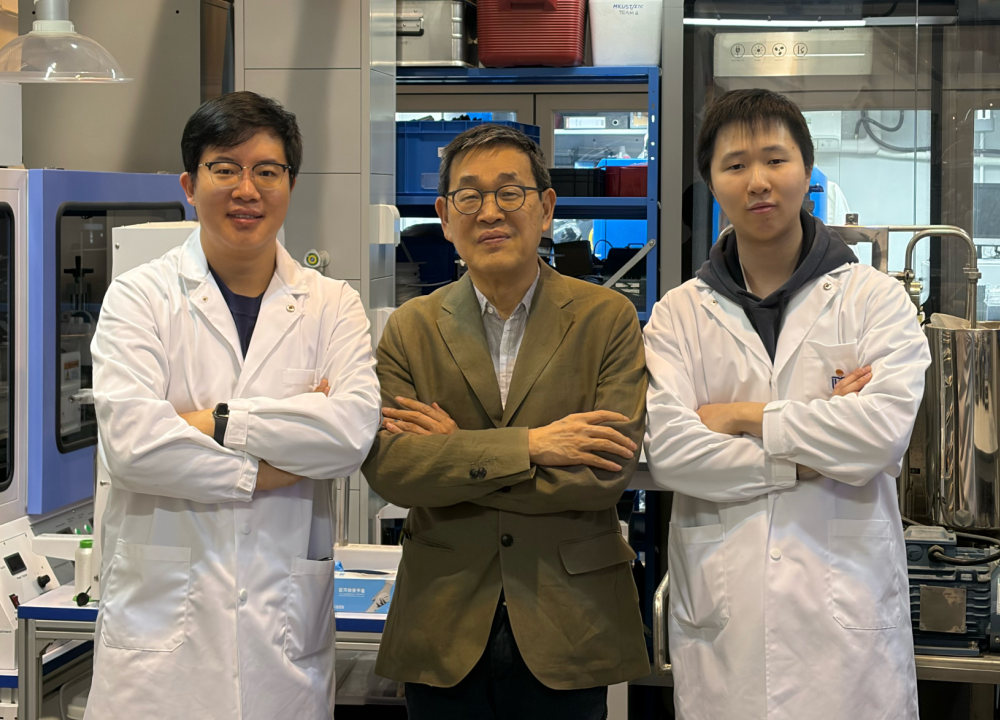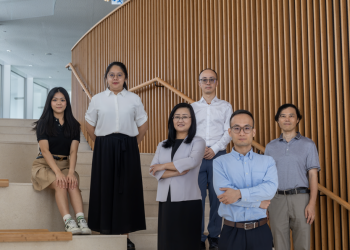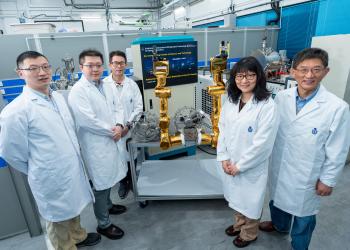News & Stories
2026

News
HKUST Develops Breakthrough High‑Efficiency, Low‑Cost Wastewater Treatment Technology
The Hong Kong University of Science and Technology (HKUST) research team has developed a groundbreaking wastewater treatment technology that integrates a mesh bioreactor with an ultrasound-induced transient cavitation cleaning mechanism. The system can complete mesh cleaning within 3.8 seconds under anaerobic conditions and achieves 10-20 times higher flux than conventional membrane bioreactors (MBRs). The technology operates efficiently with substantially lower energy consumption, produces treated effluent surpassing international and local discharge standards, and reduces the cost of treating each cubic metre of wastewater to 50% of conventional MBRs, offering a sustainable solution for both municipal and industrial wastewater treatment.

Stories
International Research Enrichment Track: Students Who Took Their Curiosity Global
The International Research Enrichment (IRE) Program at The Hong Kong University of Science and Technology (HKUST) School of Science is designed for students who feel a deep calling toward scientific discovery.Established in 2014, the IRE program offers a structured pathway for science students to engage deeply with research from an early stage, with many securing a research supervisor by their second year. The hallmark of IRE is its strong emphasis on global exposure. IRE students benefit from a scholarship that supports their required overseas internship (SCIE 3900 International Research Experience), often combined with an exchange semester. This financial assistance, coupled with flexibility in curriculum planning, enables IRE students to immerse themselves in extended international research opportunities.

News
HKUST Develops Pioneering Mechanically Interlocked Molecule-Based Materials to Advance Safe, High-Performance Lithium Metal Batteries
Researchers from the School of Engineering at The Hong Kong University of Science and Technology (HKUST) have pioneered a mechanical bond strategy to create quasi-solid-state electrolytes (QSSEs) for lithium-metal batteries (LMBs). This marks the first use of mechanically interlocked molecules (MIMs) in covalent organic frameworks (COFs) to achieve high-performance battery operation, harnessing the unique chemistry of interlocked systems to enable safe, stable, and high-energy-density LMBs.

News
Nobel Heroes@HKUST: Science Titans Inspire Next Generation at Landmark Anniversary Event
The Hong Kong University of Science and Technology (HKUST) today hosted "Nobel Heroes@HKUST", a special forum featuring four Nobel Laureates who engaged in close interactions with over 400 students, faculty members, and public guests. Held as highlight of HKUST's 35th anniversary celebrations, the event underscored the University's dedication to bridging world-renowned scholars with the local community and reinforcing its role as a leading hub for knowledge and talent development.

News
13 HKUST Research Projects Secure Top Funding from RGC Collaborative Research Fund and Research Impact Fund
The Hong Kong University of Science and Technology (HKUST) has demonstrated outstanding research leadership in the 2025/26 Collaborative Research Fund (CRF) and Research Impact Fund (RIF) under the University Grants Committee (UGC)'s Research Grants Council (RGC). The University secured funding for 13 projects under the CRF and RIF, with grants totaling more than HKD77 million. The achievement places HKUST first among all UGC-funded universities in both the number of funded projects and total funding received. This accomplishment highlights HKUST's strength in pioneering interdisciplinary and cross-institutional research, as well as its exceptional capacity for knowledge transfer in translating cutting-edge research outcomes into real-world impact that enhances societal well-being.
2025
News
HKUST Researchers Uncover Key Transport Mechanisms in Cells, Shedding Light on Causes of Genetic Diseases
A research team led by Prof. GUO Yusong, Associate Professor of the Division of Life Science at The Hong Kong University of Science and Technology (HKUST) has made a significant breakthrough in understanding how cells manage the intricate internal transport of proteins, a process fundamental to life and implicated in several hereditary diseases. By employing an innovative vesicle proteomics platform, the team has systematically identified new cargo proteins and key accessory factors for two critical cellular transport complexes, AP-1 and AP-4. The findings, published in Proceedings of the National Academy of Sciences (PNAS), combine innovative vesicle reconstitution techniques with quantitative mass spectrometry-based proteomics to unveil a comprehensive map of previously unknown cargo proteins and regulatory factors.

News
HKUST Researchers Unlock Why Arctic Ice Melt Paused
A research team led by The Hong Kong University of Science and Technology (HKUST) scholars has discovered a significant slowdown in Arctic sea ice melting since 2012, with the decrease rate of 11.3% per decade to an insignificant downward trend of only −0.4% per decade. This phenomenon is closely related to a shift in the North Atlantic Oscillation (NAO) pattern, from a negative phase to its positive phase, which traps cold air within the Arctic region. It is projected to peak between 2030 and 2040, after which the Arctic could enter a new phase of accelerated ice melt. Without reductions in greenhouse gas emissions, this may trigger severe climate and environmental crises within decades.

News
HKUST Leads International "Hong Kong Operation Robot" Project
The Hong Kong University of Science and Technology (HKUST) has been appointed by the China National Space Administration (CNSA) to lead the international "Hong Kong Operation Robot" project for the Chang'E-8 mission. The project will unite global aerospace scholars and experts to develop a multi-functional lunar surface operation robot. Equipped with a mobile charging station and capable of dexterous operations, the robot is designed to make significant contributions to the nation's lunar exploration missions.








